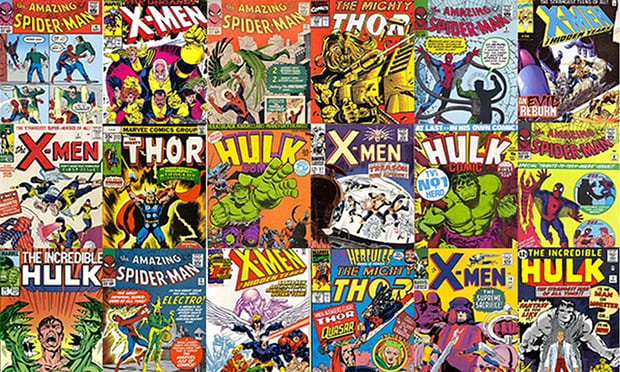
As a kid growing up in rural Buckinghamshire in the 1970s, I would get black-and-white reprints of Spider-Man every week, along with a comic called Captain Britain. But it was Spider-Man I really wanted: it had an otherworldly, sci-fi glamour that The Beano and the rest just didn’t have. Marvel comics were utterly exotic, like transmissions from another planet.
I didn’t know it as a nine-year-old, but Spider-Man was the brainchild of a man called Stan Lee, working with an illustrator called Jack Kirby. Lee left school in the late 1930s and got a job at a pulp magazine company in New York. He graduated to writer, and joined the publisher of a new series called Marvel. When he became editor-in-chief, he changed the world of comics for good.
Alhough there are debates about who exactly should take the credit, Lee was a driving force behind the creation of Hulk, Iron Man, the X-Men, Thor and many more. He was trying to create a new American mythology, and smart enough to know that you didn’t have to do it by writing the next Great American Novel. You could do it on the pages of a mass-market comic read by millions .
The stuff I was reading in the 1960s now looks dated, so it’s easy to forget how cutting edge it was. Previous American comics had flawless heroes like Superman and Flash, but Spider-Man is full of teenage angst – it’s as much about how difficult it is to grow up as it is about superpowers or killing baddies. There’s a famous issue, Spider-Man No More!, where Peter Parker is shown walking away from it all, his costume tossed in the bin. It’s about his own struggles, but also a riff on the constant question for America: should it intervene? By the end of the 1960s, the letters page in Captain America was full of people arguing about whether the US should be fighting in Vietnam. Marvel comics may be for children, but their themes are adult.
My interest petered out as a teenager, but at university I met a massive fan who had piles of them in his room. He got me hooked again. As a middle-aged man – and theoretically a grown-up – I should probably be reading Tolstoy, but I’ve made my peace with that. Judge not lest ye be judged. I reckon there are worse interests for a middle-aged bloke to have.
And the great thing about being a father is that I can do it all again. I have two girls, 15 and 11, and they’re both diehard Marvel fans. They don’t like the Batman films – too po-faced – but Marvel ones have a brilliant lightness of touch. My eldest, who has cerebral palsy, loves stories like the X-Men: she gets the allegory, the fact it’s about people who are different, though the films are never preachy. My youngest loves Scarlett Johansson as the Black Widow in Iron Man. In our house, the cunning and resourceful Black Widow reigns supreme.
The comic-book world is full of nerdy nostalgia, but I don’t really buy into that. I get comics to read, not keep in plastic wrappers as collectors’ items. I’m as happy downloading them to my iPad and taking them on tour as I am reading physical copies, though I do have a lingering preference for black-and-white. And I think we’re living through a new comics golden age – only these days it’s happening in film.
The Spider-Man TV movies of the 70s are hilarious, a bloke in pyjamas doing kung-fu, but technology has finally caught up. The recent Captain America was a post-Wikileaks saga, while Thor is co-opting an entire mythology. Sure, the whole genre is absurd, but allegory often is.
Hi! I am a robot. I just upvoted you! I found similar content that readers might be interested in:
https://www.theguardian.com/books/2014/sep/10/al-murray-why-i-love-marvel-comics-spider-man-x-men-superheroes
Downvoting a post can decrease pending rewards and make it less visible. Common reasons:
Submit
Hey @abbetim1, I enjoyed the story. Thanks for sharing! Nice post. Cheers
Downvoting a post can decrease pending rewards and make it less visible. Common reasons:
Submit
thanks
Downvoting a post can decrease pending rewards and make it less visible. Common reasons:
Submit